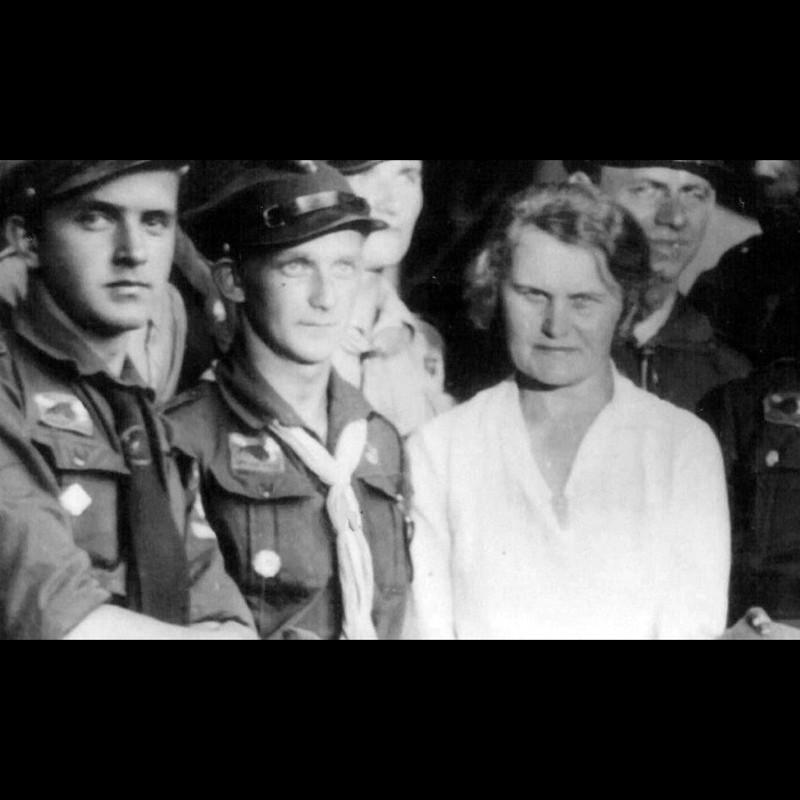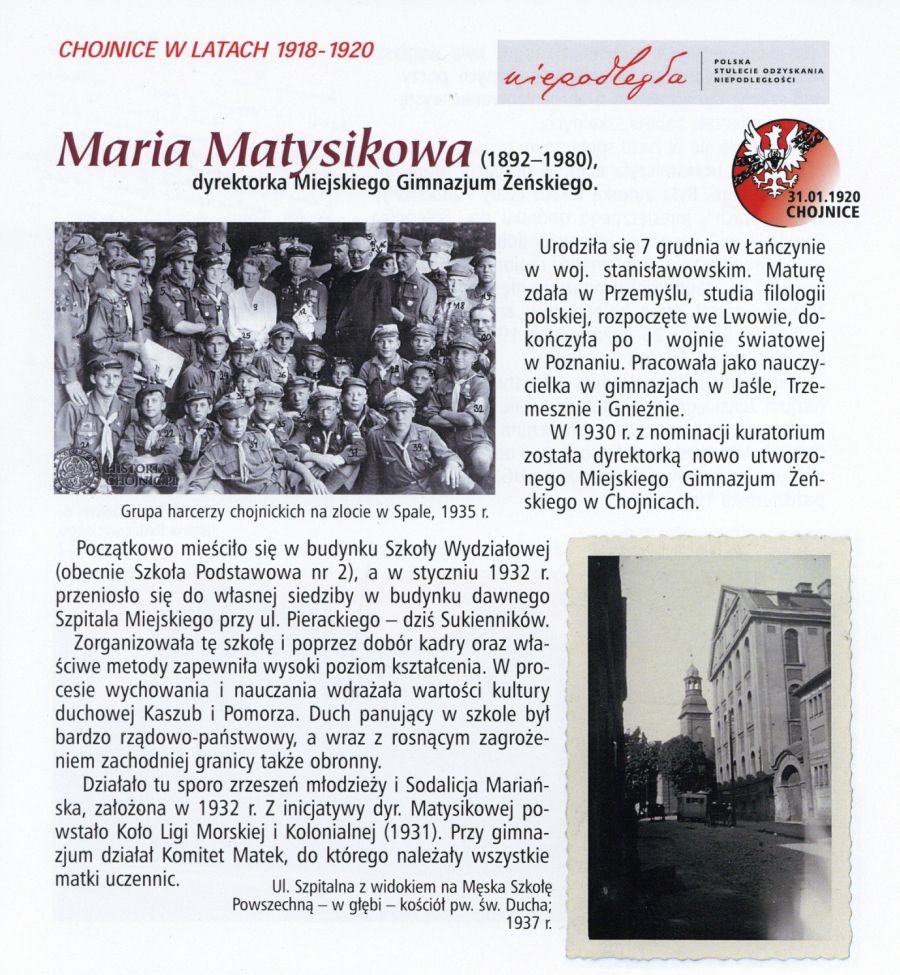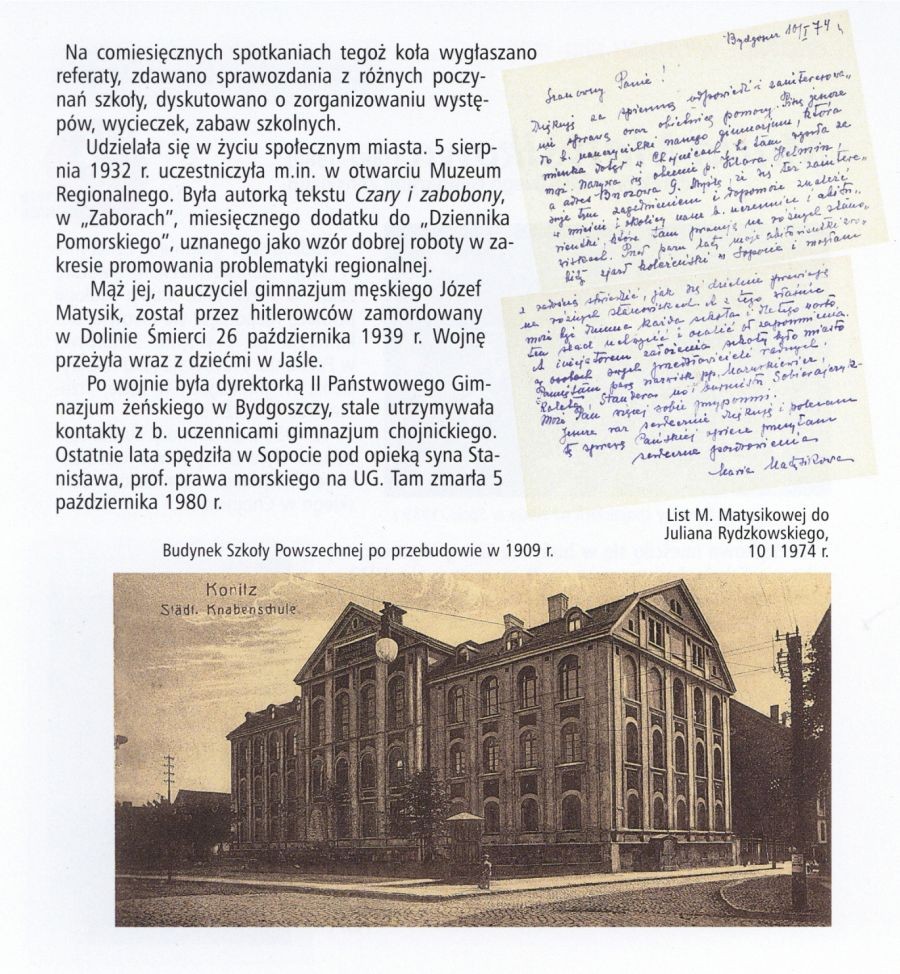
Maria Matysikowa (1892-1980), founder and headmaster of the Municipal Female Gymnasium (1930 - 1939)
A very important role in shaping the views and attitudes of the younger generation has been and continues to be played by teachers, outstanding educators and school principals. They are the ones who, after parents, teach correct behaviour and pass on knowledge. Although the world around us is constantly changing and technology is advancing, the most important and universal principles shown to children and young people remain unchanged.
Undoubtedly, Maria Matysikowa, the headmistress of the Municipal Female Junior High School in Chojnice, was an outstanding educator and an exceptional human being who had a great influence on her pupils. She was born on 7.12.1892 in Łańczyn, to Wiktor and Genowefa Woźniczko n. d. Saszewska. Saszewska. Her father was a clerk in Myślenice, in the Cracow voivodship. Maria passed her secondary school leaving examinations in Przemyśl, after which she studied Polish philology at UJK in Lviv. Interrupted by the outbreak of the First World War, she completed her studies at the University of Poznań. Her personal life changed in 1914, as she married Józef Matysik, a secondary school teacher. Together with her husband, she worked at the institutions to which the education authorities had sent them: in Jasło, Trzemeszno and Gniezno.
By order of the School District Board of Trustees in Toruń, Maria Matysikowa was to organise a self-governing unit. To this end, she arrived in Chojnice in August 1930. She agreed a programme and statutes for the school with the town authorities, which the superintendency accepted. Maria Matysikowa was appointed director of the Municipal Female Gymnasium in Chojnice. The ceremonial inauguration of the gymnasium took place on 2 September 1930 in the auditorium of the public school, with numerous representatives of councillors and the local intelligentsia in attendance. It was a very important event in the history of the town's development at the educational level. The school was located in the former building of the Municipal Hospital in Pierackiego Street (now Sukienników Street). The grammar school under her leadership took care of the all-round development of its pupils, as well as preparing them for social life. Maria Matysikowa's great desire was to pass on the values of the spiritual culture of Pomerania and Kashubia in the teaching and upbringing process. This was served by MGŻ's multifaceted contacts with the city and regional environment through: sightseeing meetings with schoolchildren and inhabitants of Kashubian villages, as well as active participation in the public and cultural life of Chojnice. Among the female teachers, Matysikowa organised a group of speakers who repeatedly travelled with lectures and talks to Polish schools and organisations in Złotów, Zakrzewo, Radawnica and other places. She ensured a high level of education through the selection of teaching staff and appropriate teaching methods. Maria Matysikowa initiated the establishment of the Maritime and Colonial League Circle, as well as the Mothers‘ Committee at the secondary school, to which all the pupils’ mothers belonged. At monthly meetings at the school, papers were given, reports were given on the school's many activities, and discussions were held about organising theatre performances, plays and school trips.
During the opening of the Regional Museum in Chojnice on 5.07.1932, Maria Matysikowa, who was also active in the social life of the town, could not be absent. She was the author of the text ‘Witchcraft and superstition’ published in ‘Zabory’, a supplement to ‘Dziennik Pomorski’, which was regarded as a model for promoting regional issues.
The outbreak of the Second World War ended the existence of MGŻ. In her personal life, this time was also associated with a tragic experience - the death of her husband Józef, murdered by the Nazis in the Valley of Death on 26.10.1939 in Chojnice. As a widow, she and her children moved to Jasło. Then, after 1945, she moved to Bydgoszcz, where she co-organised the Second State Female Gymnasium. As principal of this school, she drew on her extensive teaching experience. After her retirement, she continued to live in Bydgoszcz, surrounded by the respect of several generations of her female pupils. As a teacher with a true vocation, she was interested in the fate of her pupils, maintained numerous contacts with them and rejoiced in their successes. She spent the last period of her life in Sopot in the care of her children. She died there on 5 October 1980 and was buried there.
She was an excellent teacher of the Municipal Female Gymnasium in Chojnice and an undoubtedly meritorious headmistress who had at heart the good upbringing and high level of education of her pupils. She created in the school an atmosphere of community, friendly cooperation and respect for learning. She also won the respect of the Chojnice community by contributing to the development of education. After her move, she remembered our town with fondness. The strong and lasting educational influence of MGŻ in Chojnice was expressed, among other things, in the meetings of former pupils and graduates organised years later. They spoke of the beloved headmistress with great kindness and emphasised her pedagogical merits. The first reunion took place in August 1980, at which the idea was born to perpetuate the memory of the school in the form of a plaque. The next reunion was held on 4 June 1983, attended by more than 50 former pupils and 3 female teachers. A commemorative plaque was then unveiled, placed on a granite boulder, in front of the school building with the inscription: ‘This edifice housed the Municipal Female Gymnasium and Lyceum from 1930 to 1939, an important educational institution on the then borders of the Republic of Poland.’
More information about Maria Matysikowa can be found in the following publications: ‘Pamięci godni. Chojnicki słownik biograficzny 1275 - 1980’ by Zbigniew Stromski, “Zeszyty Chojnickie VII/VIII”, ’Poczet zasłużonych Chojniczan. A biographical dictionary of the 20th century’ by Kazimierz Ostrowski.

